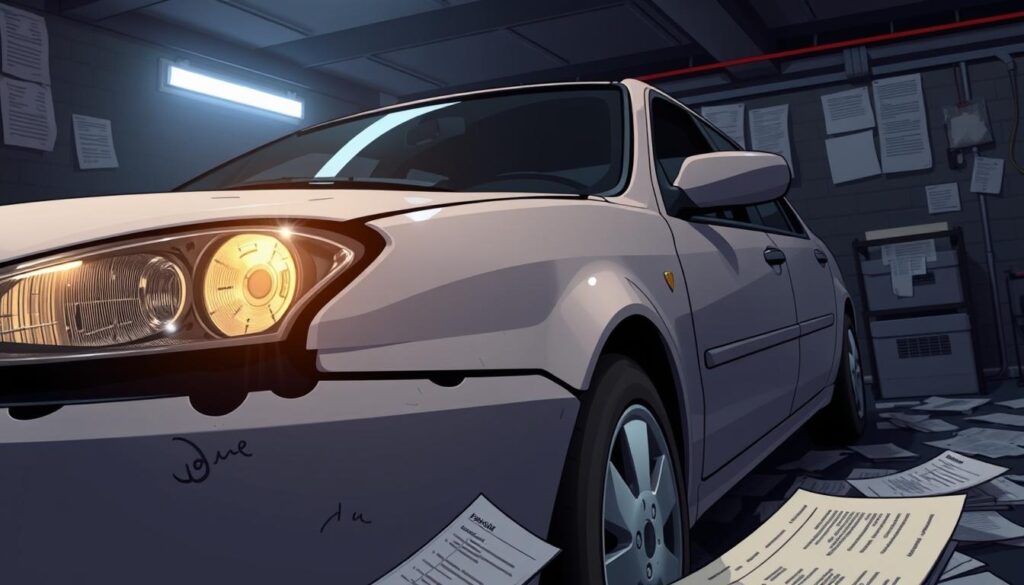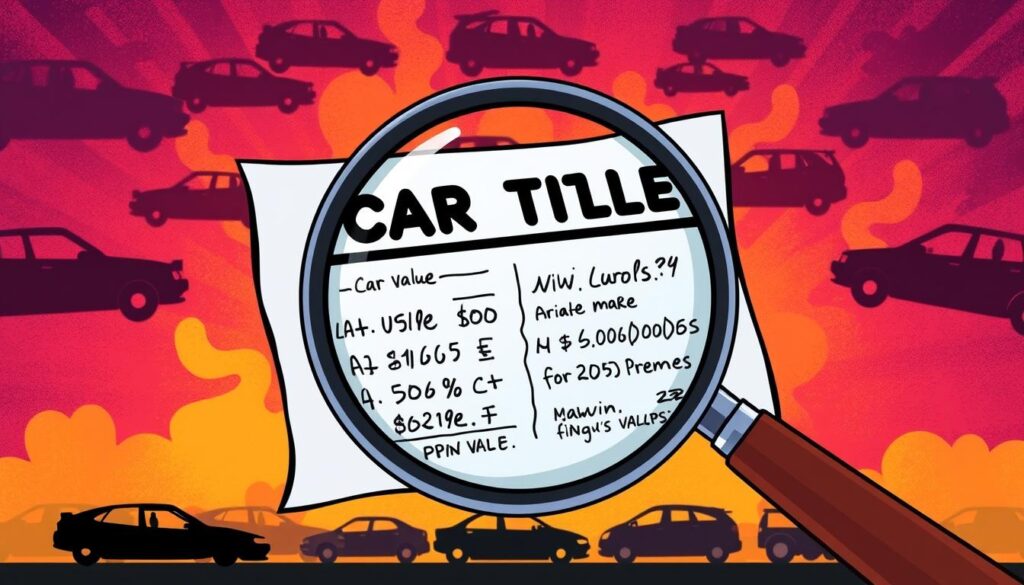What Does Branded Title Mean: Car Title Status Guide
Do you know what a “branded title” means for your car? It’s important to understand vehicle title branding. This knowledge helps buyers and sellers in the used car market. A car’s title status affects its value, insurance, and your ownership experience.
Table of Contents
Key Takeaways
- Branded titles show a vehicle’s history, like damage or salvage.
- Different title brands affect a car’s value, insurance, and future ownership.
- It’s key to check a vehicle’s title status before buying.
- Buying a car with a branded title has risks and benefits, depending on the situation.
- Understanding the legal and financial sides of branded titles is vital for a smooth transaction.
Understanding Branded Title Basics
A branded title on a vehicle’s title means it has major damage or was in a big event. These titles include salvage, rebuilt, and flood-damaged. They show the car’s history and current state.
Types of Vehicle Title Brands
- Salvage Title: Given to cars that insurance says are a total loss due to damage or theft.
- Rebuilt Title: Shows a car was fixed and is safe to drive after getting a salvage title.
- Flood Damage Title: Means a car got water damage and was submerged.
- Lemon Title: Indicates a car had many problems and was bought back by the maker.
How Title Branding Affects Vehicle Value
Cars with branded titles are worth less than clean ones. The drop in value depends on the title type and damage history. For instance, a salvage title might cut the value by 30-50%. A rebuilt title could lower it by 10-20%.
Common Reasons for Title Branding
Cars get branded titles for several reasons:
- Accidents: Big crashes that cause a lot of damage.
- Theft Recovery: Cars stolen and found, often with damage.
- Natural Disasters: Damage from floods, hail, or other disasters.
- Manufacturer Buybacks: Cars bought back by the maker because of ongoing problems.
Knowing about branded titles is key when looking at used cars. Understanding the different titles helps you make smart choices. It helps you avoid problems with cars that have been damaged or had issues.
What Does Branded Title Mean and Its Implications
A branded title on a vehicle’s certificate of ownership means the car has major damage. It could be a total loss or have other issues that lower its value. Knowing about a branded title is key for buyers and owners. It affects the car title status and how you can finance, insure, and sell the car.
A branded title shows the car’s history is not perfect. This can drop the car’s resale value by thousands. Buyers might be hesitant to buy a car with a branded title. It suggests the car has had big problems and might need a lot of repairs.
| Branded Title Implications | Impact |
|---|---|
| Resale Value | Significantly reduced, often by 20-50% or more |
| Insurance Coverage | Limited or more expensive, with potential exclusions |
| Financing Availability | Reduced options, higher interest rates, or denied loans |
| Registration and Titling | Additional paperwork, fees, and potential restrictions |
A branded title can lead to many challenges for car owners. These include financing, insurance, resale, and even registration issues. It’s vital to understand these implications when buying or owning a car with a branded title.
The Difference Between Clean and Branded Titles
There are two main types of car titles: clean and branded. Knowing the difference is key for anyone looking to buy a car.
Clean Title Characteristics
A clean title means a car has no major damage or repair history. This makes the car more desirable and worth more.
Branded Title Indicators
A branded title shows a car has had a big problem, like a major accident or flood damage. This information is on the title, helping buyers know what they’re getting.
Impact on Insurance Coverage
The title of a car affects insurance costs. Cars with branded titles are seen as riskier, leading to higher insurance prices. Clean-titled cars usually get better insurance deals.
| Title Type | Characteristics | Insurance Impact |
|---|---|---|
| Clean Title | No significant history of damage or issues | More favorable insurance coverage and premiums |
| Branded Title | Experienced significant events (e.g., accident, flood, salvage) | Higher insurance costs or difficulty obtaining coverage |
Understanding the difference between clean and branded titles is crucial when buying a car. By checking the car title status and its effect on insurance coverage, buyers can make better choices.
Salvage Title Vehicles: Risks and Benefits
Understanding “salvage title” vehicles can be both fascinating and scary. But what does it mean, and what are the pros and cons of buying one? Let’s dive into the world of salvage title vehicles and guide you in making a smart choice.
A salvage title vehicle is one that insurance companies say is a total loss. This happens due to big damage from accidents, floods, fires, or other disasters. These cars are fixed and sold cheaper, often at auctions or salvage yards.
Risks of Buying a Salvage Title Vehicle
- Potential for hidden or unrepaired damage: Salvage vehicles might have hidden problems that could cost a lot to fix later.
- Difficulty obtaining financing and insurance: It’s hard to get loans or insurance for salvage title cars.
- Reduced resale value: The salvage title can make the car’s value drop, making it hard to sell for a good price.
Benefits of Buying a Salvage Title Vehicle
- Significant cost savings: You can buy salvage title cars for much less than clean-titled ones, saving money.
- Opportunity for DIY repairs: If you can fix cars yourself, you can save a lot by doing the repairs yourself.
- Unique customization options: Salvage title cars offer a chance to make the car your own with custom parts and upgrades.
Thinking about a salvage title car? It’s key to think about the good and bad sides to see if it fits your budget and needs. Do a detailed check, get a car history report, and talk to a mechanic to make a wise choice and avoid problems.
How to Check if a Car Has a Branded Title
Before buying a car, it’s key to check if it has a branded title. This step helps you avoid any future problems. Let’s look at the best ways to find out if a car has a branded title.
Vehicle History Report Services
Carfax and AutoCheck offer vehicle history reports that show a car’s past. These reports include info from DMV records, auctions, and insurance companies. They give you a full picture of the car’s history.
State DMV Resources
Another good way is to contact your state’s DMV. They can tell you about the car’s title status. The DMV has the latest info on the car’s title and any past issues.
Professional Inspection Tips
A detailed car inspection by a mechanic is also helpful. A skilled mechanic can find signs of damage or repairs. This can help you understand why a car might have a branded title.
Using these methods, you can be sure if a car has a branded title. This helps you make a smart choice that fits your needs and budget. Remember, taking the time to check can save you from future troubles.
Buying a Car with a Branded Title: Important Considerations
Buying a car with a branded title can be both good and bad. On one side, these cars are cheaper than clean-titled ones. But, you must think about the risks and long-term effects of owning such a car.
Before you decide to buy branded title cars, know how it might affect the car’s value and resale considerations. Branded titles can come from accidents, floods, or odometer issues. These can harm the car’s structure and condition.
- Thoroughly inspect the vehicle: Have a trusted mechanic check the car for any hidden problems. This will help you figure out the repair costs.
- Research the vehicle’s history: Get a detailed report on the car’s history to understand the branding. This will tell you about the car’s condition and future.
- Negotiate the price accordingly: After knowing the car’s condition and repair costs, talk about the price. Make sure it reflects the car’s true value, including the branded title.
- Consider the resale value: Remember, a branded title can hurt the car’s resale value. This might limit your selling options and future profits.
Buying a car with a branded title needs careful thought and research. The savings might be tempting, but consider the risks and long-term effects. Make a choice that fits your needs and financial plans.

“The key to success when buying a car with a branded title is to approach it with caution, conduct extensive research, and negotiate the price accordingly.”
Legal Aspects of Branded Titles Across States
Understanding the laws about branded titles is key when dealing with vehicles. Each state has its own rules. These rules affect who can own, transfer, and insure these vehicles.
State-Specific Regulations
Laws on branded titles vary a lot from state to state. Some states have strict rules for selling and registering these vehicles. Others are more relaxed. It’s important to know the laws in the state where you’re buying or registering a vehicle.
Title Transfer Requirements
Transferring a vehicle’s title with a branded title can be different in each state. Some states might need extra paperwork, inspections, or fees. Knowing these requirements early can make the process easier.
Disclosure Laws
Most states require sellers to tell buyers about a vehicle’s branded title. Not telling can lead to legal trouble. Buyers should also know their rights and what sellers must tell them.
| State | Branded Title Regulations | Title Transfer Requirements | Disclosure Laws |
|---|---|---|---|
| California | Vehicles with branded titles must undergo a thorough inspection before registration. | Buyers must provide proof of ownership and pay applicable fees to transfer the title. | Sellers are required to disclose the branded title status to buyers before sale. |
| Texas | Branded titles are issued for vehicles that have been declared a total loss or have significant damage. | Title transfer requires the submission of the original title and appropriate fees. | Sellers must disclose the branded title status in writing to the buyer prior to sale. |
| Florida | Vehicles with branded titles may not be eligible for certain registration and insurance options. | Title transfer involves submitting the existing title and completing the necessary paperwork. | Florida law requires sellers to disclose the branded title status to buyers before the sale. |
Knowing the laws about branded titles is important for both buyers and sellers. By learning about the specific rules, transfer needs, and disclosure laws in each state, you can make smart choices. This helps you navigate the complex world of vehicles with branded titles.
Financing and Insurance Challenges for Branded Title Vehicles
Buying a car with a branded title can be tough. You might find it hard to get a loan or find affordable insurance. Knowing these issues is key for anyone looking at a branded title car.
Navigating Branded Title Financing
Getting a loan for a branded title car is harder than for a clean title one. Lenders often see these cars as riskier. But, there are alternative financing options like personal loans or buy-here-pay-here dealerships.
These might have higher interest rates or less good terms. Yet, they can help you own a reliable car.
Insurance Challenges
Insuring a branded title vehicle has its own hurdles. Insurers might not want to cover it fully or charge higher premiums. Sometimes, they won’t offer collision or theft coverage.
So, you need to do your homework and be ready for the insurance challenges. This way, you can make smart choices for your situation.
Dealing with the financing and insurance obstacles of branded title cars takes effort and creativity. By understanding these challenges, you can find the right way to move forward.

“Navigating the financial landscape of a branded title vehicle requires patience, creativity, and a willingness to think outside the box.”
Hidden Costs and Long-Term Implications of Branded Titles
Buying a car with a branded title can have hidden costs and long-term effects. These include higher maintenance costs and a big hit on resale value. Knowing these points is key to deciding if a branded title car is right for you.
Maintenance Expenses
Cars with branded titles need more maintenance because of hidden problems or damage. This means you’ll spend more on repairs and upkeep. Be ready for higher costs for regular checks and unexpected fixes.
Resale Value Impact
A branded title can really lower a car’s resale value. This makes it harder to sell the car for a good price later. It’s something to think about for your long-term car plans.
Future Ownership Considerations
Having a car with a branded title can make selling it harder. Some people won’t want to buy a car with a branded title. Also, there might be stricter rules for registration and insurance, making owning the car more complicated.
Before buying a car with a branded title, think about the costs, resale value, and long-term ownership. Knowing these can help you decide if it’s the right choice for you.
Conclusion
A branded title vehicle has seen a lot of damage or has been salvaged. These cars might be cheaper, but it’s key to check their history well. This helps you understand the risks and costs before buying.
Looking into the vehicle history and knowing what a branded title summary means is crucial. This research helps you make a smart choice. It ensures you avoid surprises and legal issues later on.
Deciding to buy a branded title vehicle is a personal choice. It depends on your needs and what you’re looking for. By carefully considering the pros and cons, you can find the right car for you. This could be a reliable ride or a chance to fix up a salvaged car.
FAQ
What does a branded title mean?
What are the different types of vehicle title brands?
How does a branded title affect a vehicle’s value?
What are some common reasons for a vehicle to receive a branded title?
What are the implications of owning a vehicle with a branded title?
What is the difference between a clean title and a branded title?
What are the risks and benefits of purchasing a salvage title vehicle?
How can I check if a car has a branded title?
What should I consider when buying a car with a branded title?
How do state laws and regulations affect branded titles?
What are the financing and insurance challenges with branded title vehicles?
What are the long-term implications of owning a vehicle with a branded title?
Contact:
Website: www.huhuly.com
Email: [email protected]

